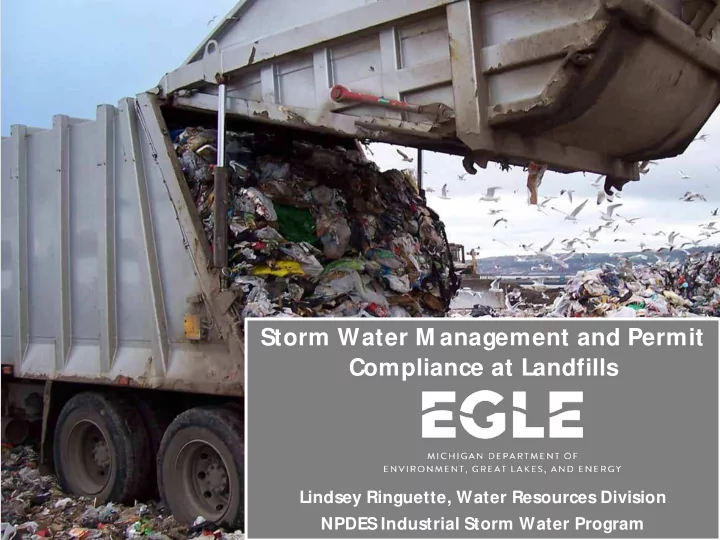

Storm Water M anagement and Permit Compliance at Landfills Lindsey Ringuette, Water Resources Division NPDES Industrial Storm Water Program
NPDES Industrial Storm Water Permit Program The intent of the program: Reduce and eliminate pollutants discharged to the surface waters of the state from industrial facilities Control pollutants at the sources by implementing best management practices It has been a federal program since 1987 under the Clean Water Act Since 1994 DEQ has had the authority A to issue permits under Part 31 of NREP and conduct compliance and enforcement actions
How is permit applicability determined? 3 questions need to be answered… 1. Is the Standard Industrial Classification (SIC) code or Primary Activity federally regulated by 40 CFR 122.26? 2. Does storm water from the property discharge to the surface waters of the state? 3. Is there exposure of industrial materials and / or activities to storm water runoff?
Step 1 - SIC Codes and Primary Activities SIC codes - What are they? • Coding system used to categorize industries and services • Used to describe the industrial activity creating revenue or employing the majority of the workers Primary Activities • Activities that are not regulated by SIC code (specifically) by the industrial activity occurring at the site How does it apply to your industry?
SIC code & Primary Activities Continued… Waste Collection and Hauling (Sector P: Land Transportation and Warehousing; Subsector 3: M otor Freight Transportation and Warehousing; SIC Code 4212) This sector applies to facilities engaged solely in the collection and hauling of waste. The sector does not apply where the operation also includes disposal of the waste (e.g., landfills and incinerators). Further, this sector applies only to that portion of the facility, if any, where vehicle and equipment maintenance or equipment cleaning occurs.
SIC code & Primary Activities Continued… Landfills, Land Application Sites, and Open Dumps (Sector L: Landfills and Land Application Sites; SIC Code LF) • This sector includes operational and closed facilities that receive or have received industrial waste, including sites subject to regulations under Subtitle D of RCRA. • Inactive, closed, or capped landfills are no longer subject to storm water permitting requirements when EPA determines the land use has been altered such that there is no exposure of significant materials to storm water. These determinations will be made by EPA or the NPDES Permitting Authority on a case-by-case basis.
SIC code & Primary Activities Continued… Composting Facilities • SIC code 2875, which is federally regulated. • A facility that qualifies as a registered composting facility under Part 115, Solid Waste Management, of the NREPA. o Facilities managing over 200 cubic yards of yard clippings must register with EGLE .
SIC code & Primary Activities Continued… Hazardous waste treatment, storage, or disposal facilities (including those that are operating under interim status or a permit under Subtitle C of the RCRA)
Step 2 – Discharge to surface water of the state Surface waters include rivers, lakes, streams, and wetlands
Site survey… Red Arrows – Storm water flow direction Yellow Arrows – Storm Water Discharge Points Purple Line – Creek (surface waters of the state)
Have these on-site? Be sure you know where the catch basins discharge … combined or separate sewerage system?
Have these on-site? Detention Pond or Retention Pond? M ake sure you know the difference. Detention Pond – Discharge to surface waters of the state Retention Pond – No discharge to surface waters of the state
Step 3 - Exposure
Exposure… Containers Residues or waste left in containers
Exposure… Trailers / Vehicles Drippings and leaks from solid waste trailers and vehicles
Exposure… Vehicle M aintenance items Batteries, Tires, Part Cores, Scrap Parts, etc.
Exposure… Fueling & Washing Leaks, Drips, Spills associated with vehicle fueling Waste water and residue associated with vehicle washing
Exposure… Composting Areas F ood Scraps, M anure, Sediment, Organic M atter, Compost Wastewater, Etc.
• Exposure… Soil Erosion / Sedimentation H aul Roads, Slopes, Dewatering Areas, Etc.
If all three criteria apply then… An NPDES industrial storm water permit will be needed Facilities required to obtain a permit will need to do the following: Develop and implement a Storm Water Pollution Prevention Plan (SWPPP) Acquire the services of a Certified Storm Water Operator Pay an annual permit fee of $260 Valid for 5yrs
• • SWPPP Requirements Develop a site map Source Identification Non-Structural Controls • Routine Inspections, Employee Training, Quarterly Comprehensive Inspections & Visual Assessments, Material Handling Procedures, TMDL Specific Activities Structural Controls Annual Report Submittal
If all criteria apply except exposure… The facility is required to submit a No Exposure Certification (NEC) form All facilities have the option to try and meet the conditions of a NEC Facilities must reapply for NEC every 5 years
Submit nothing if… SIC code or Primary Activity isn’t federally regulated, or Storm water from the property doesn’t discharge to the surface waters of the state
In Summary Facilities need to obtain an NPDES Industrial Storm Water Permit if: 1. The facility’s SIC code or Primary Activity is federally regulated 2. Storm water from the property discharges to surface waters of the state 3. There is exposure of industrial materials and / or activities
Want more info on the industrial storm water program? Industrial Storm Water webpage: www.michigan.gov/ deqstormwater (then click on Industrial) M arquette District Office contact: Lindsey Ringuette 906-228-4806 ringuettel@michigan.gov
Recommend
More recommend